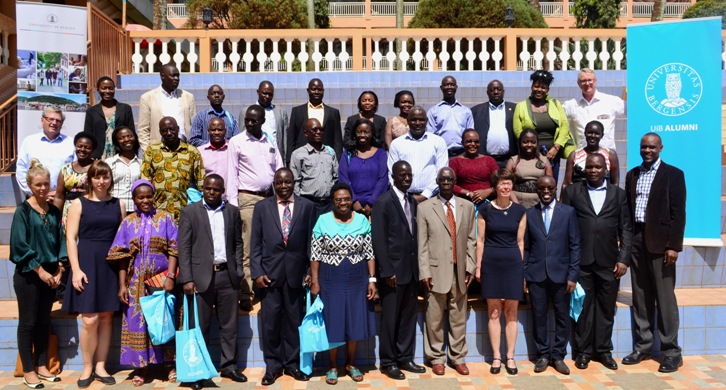“If we do not collaborate we shall never grow. Internationalization is extremely important for Universities to collaborate in research and students exchange. The network we are launching today will be in position to attract more partnerships and collaborations for valuable and positive change,” remarked the Vice Rector for International Affairs, Anne Christine Johannessen when launching the University of Bergen Alumni Network in Uganda.
Launched on Monday 7th November 2016, the University of Bergen (UiB) Alumni Network in Uganda provides a platform to Ugandans who have studied at the University of Bergen, Norway to connect and build strong networks, share knowledge and ideas for community transformation and explore approaches aimed at fostering relations between Uganda and Norway.
Speaking to the UiB alumni during a luncheon held at Hotel Africana, Anne Christine Johannessen said that the network will be considered as one of the pillars in building up and strengthening collaboration in research, knowledge sharing, capacity building and community engagement in Uganda, Africa and Norway.
She informed the UiB alumni that the network presents them with an opportunity to mobilize resources and a platform to immensely engage in more collaborations and partnership to help find solutions to the problems/challenges affecting society.
“You are alumni; you are the ambassadors of your societies. You are the ones who can tell about your society. In this drive of finding solutions to African challenges, we expect you to be at the fore front to lead your community in this noble cause. You have whatever it takes, we mentored you; we therefore expect you to mentor others,” she said.
Reflecting on the long term collaboration between University of Bergen and Makerere University , the Coordinator of the Mak-UiB Collaboration programme, Prof. Edward Kirumira sai d the UiB Alumni network will cement the relationship between University of Bergen Norway and Makerere University-Uganda.“ Through this network, the alumni will be able to demonstrate the fact that the two u niversities have trained active people. We would like to see alumni giving back to their communities, mobilizing resources for Universities as well as consolidating universities’ benefits,” he said.
According to Prof. Kirumira, the collaboration between Makerere University and the University of Bergen started in 1999. “I would like to say that Makerere University has been the main beneficiary of this support. The collaboration has enab led Makerere University students and staff to go for furthers studies, funded its research and innovations as well as providing equipments to support teaching and learning processes,” he said.
Sharing an inspiration story on Makerere University’s successful journey with University of Bergen, Prof. Livingstone Luboobi-a former Vice Chancellor of Makerere University happily noted that the collaboration that started in form of individual Professors/Scholars undertaking research and teaching in the then Department of Physics at Makerere University has grown over the years into an institutionalized programme within both Universities. Both Universities run institutionalized Mak-UiB Collaboration Offices. Currently, Prof. Edward Kirumira is the Coordinator of the programme at Makerere University while Prof. Thorklid Tylleskar is the Coordinator at the University of Bergen-Norway.
Prof. Luboobi highlighted that the introduction of the Mak-UiB collaboration after the NUFU program in 1999 opened gates for more partnership and networking opportunities that tremendously led to growth and development at Makerere University.
“Mak-UiB collaboration unveiled many other partnerships. Two years ago we renewed the agreement and we are growing strong. We are going forward after the NUFU program. This partnership laid the first brick for other partners; I am glad to say that with this example, I was asked by Sweden to set a similar program. Since then Makerere University has taken on several partnerships such as the Rockefeller foundation, MasterCard Foundation programs among others,” said the former Vice Chancellor of Makerere University, Prof. Livingstone Luboobi.
In a presentation on the importance of supporting higher education, Hon. Sam Okuonzi, an alumnus from the University of Bergen said universities should prioritize seeking scholarships and support for higher education. He urged the alumni to gear the network towards elevating the image of higher education in Uganda.
Prof. Thorklid Tylleskar mentioned that the University of Bergen Alumni Network in Uganda will help the alumni to provide solutions for the anticipated future challenges affecting different communities. He highly recommended the long term collaboration between Makerere University and University of Bergen especially in the field of health.
“The reason why we engaged in this collaboration is because we share the same interest in particular programs such as health. The collaboration between Makerere University and the University of Bergen particularly in health is not limited to Uganda. We have expanded it to other sub-Saharan African countries,” he said.
Giving the way forward, Dr. Ronald Semyalo highlighted that they focused on creating a global interconnected network that is able to impact development in terms of promoting and maintaining quality higher education in Africa.
Ms. Alex Nakato, a member of the Organising Committee thanked the alumni for all the efforts to make the launch a success. She thanked the University of Bergen, Makerere University and the Royal Norwegian Embassy in Uganda for enhancing professional development and networking in different Universities.
Article by: Mak News Reporters and edited by: Ritah Namisango


 General10 hours ago
General10 hours ago
 General9 hours ago
General9 hours ago
 Humanities & Social Sciences1 week ago
Humanities & Social Sciences1 week ago
 General1 week ago
General1 week ago
 Agriculture & Environment2 weeks ago
Agriculture & Environment2 weeks ago


